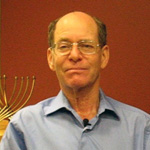By Stanley Tiger

SAN DIEGO — Although today his name is not a household word, it may be a measure of his success – his success in remaining private. Herman Wouk, celebrating his 102nd birthday on May 27th, is known for the value he places on his privacy, yet this extraordinary writer remains a luminary in the American psyche, best known for the regularly broadcast movie, The Caine Mutiny (1951), starring Humphrey Bogart and Fred MacMurray. It is based on his experience as a naval officer in World War II and had the added bonus of becoming a smash Broadway hit. As one of around two dozen published works in 27 languages, others were also best sellers and TV mini-series.
With awards, medals and honorary degrees from the US and Israel including a Pulitzer Prize, with lifetime achievement awards from the Jewish Book Council and the Library of Congress plus an autobiography written at the age of 100, you think he’s slowed down? Maybe, but only by a few knots.
Getting a start as a comedy writer on national network radio, he still has projects, working, studying and praying every day. Now a resident of California, he was born in the Bronx and spent his early life in NYC. Perhaps his vitality and longevity lends some credence to the alleged superior quality of New York City drinking water?
What makes a great writer a greater writer is the desire to research, examine and understand every possible dimension of knowledge related to the forthcoming book. With this attitude, Wouk spent sixteen years researching two major subsequent novels, The Winds of War (1971) and War and Remembrance (1978). As part of his research, he visited the eventually-to-become Nobel Laureate physicist, Richard Feynman, for greater scientific insight into the Manhattan Project. Wouk tells the story of how Feynman tried to explain the mathematics of nuclear reactions, which Wouk could not grasp, having neither a mathematical background nor much aptitude for the subject. Realizing this, Feynman advised the novelist to study calculus. “You had better learn it. It’s the language God speaks,” as Feynman phrased it.
Wouk took seriously this gap in his understanding of a subject that he wanted to better explore as an insight for his coming novels. As much as he tried, which included eventually taking and withdrawing from a high school calculus class, he had to abandon the effort. But most certainly, he must have taken much relief in asking a more religiously Jewish scientist than Feynman, if indeed calculus is truly the language God talks. The biologist explained that calculus is the second language God talks. The first language is Hebrew! Wouk’s diligent research also allowed him to later write, The Language God Talks: On Science and Religion (2010).
The author, having studied philosophy at Columbia University, received his B.A. in 1934. He tells the story of an invitation accepted by the British philosopher, Isiah Berlin, to join him for Seder. Both men davened together and had a wonderful evening of song and discussion. As Wouk humorously described it – you can learn a great deal from a man when you “break matzo together.”
The appreciation and thankfulness for the Jewish tradition shines through both his novels and the books he has written on the subject. In one of his most eloquent passages, he first describes Moses and the Book of Exodus. He then continues… “I will make no attempt to describe the Hebrew Bible in detail. The books cover thousands of years. Empires, dynasties, gods rise and fall. The narrative follows the fortunes of the House of Israel through the stress of great events. and it builds a picture of human nature drawn from all sides. Its chief figure has no match in the writings of the world; It is God. In the Jewish faith, Scripture after the Torah is commentary, illumination and sequel. The Books of Moses shadow forth the future of Israel. In the rest of Scripture it all comes to pass. Time unfolds triumph and trouble. It brings human spirits that gleam out like stars: Samuel, David, Isaiah, Jeremiah, Ezekiel and the rest, a constellation of religious genius that still lights the world.” (This is My God, 1959)
And his own philosophy of what makes a good novel? He indirectly reveals this in Youngblood Hawke (1962), a novel about a novelist – a Kentucky born Pulitzer Prize winning author and playwright that depicted his ventures and romps bouncing between the high stakes playgrounds of Manhattan and Hollywood. The eponymous character explains that the primary purpose of a novel is to entertain. Within this context, the author can express his opinions, philosophies and personal musings.
Referring now to the autobiography written at his century mark, Sailor and Fiddler: Reflections of a 100-Year-Old Author (2015), the question arises – what is so great about old age? It’s a fair question which one nonagenarian candidly shared with me that it is a question he asks himself every day. One response from the wisdom of the Jewish tradition explains that the blessing of an old age is the granting of the ability to continue the doing of good deeds, “mitzvahs.”
Wouk’s writing remains an enduring mitzvah for all of us. That he has never been awarded a Nobel prize speaks more about important omissions of the Prize than it does about his writing. But, at 102, he has won a much greater prize from a much higher authority – the gift of continuing to do his writing, his mitzvahs, and the gift that we share every day in thanking God for restoring his soul.
Happy birthday, Mr. Wouk!
*
Tiger is a freelance writer based in San Diego
Happy Birthday Mr. Woulk.
An inspiring writer. I first encountered him in high school, and still – 45 years later – reread him regularly; and I introduced him to my son. An amazing individual. May God continue to bless him.